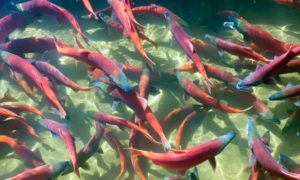
![]()
The lawsuit accused seafood powerhouses of violating the Sherman Antitrust Act when they allegedly exchanged competitively sensitive information to control the price of farm-raised salmon purchased by American seafood buyers.
By Michael A. Mora | March 26, 2021

Something fishy is going on in litigation in the Southern District of Florida.
U.S. District Judge Cecilia M. Altonaga allowed a class action with members numbering in the hundreds of thousands to move forward against several major Norwegian salmon farming firms.
Peter Prieto, a partner at Podhurst Orseck in Miami, is the lead attorney in the consolidated case representing the plaintiffs, who consist of corporations located in Ohio, New York, Florida, New Jersey and Pennsylvania that were direct purchasers of salmon and have suffered monetary loss.
And Prieto said on Friday that the takeaway is that now that their detailed allegations have survived a motion to dismiss, his team will prosecute their claims on the merits against the defendants, which include Mowi ASA, Grieg Seafood ASA, SalMar ASA, Leroy Seafood AS, Cermaq Group AS and Cermaq Norway AS.
“What we seek are the damages that our class sustained, which is essentially that they overpaid for the price of salmon because of the defendants’ conduct,” Prieto said. “Hopefully, that’s a positive not simply for our class members, who are direct purchasers from the salmon farmers, but also for the consumer, those going to restaurants and eating salmon, [who] will see the price decrease and not continue to increase.”
The lawsuit accused these major fish companies of violating the Sherman Antitrust Act when they allegedly exchanged competitively sensitive information to control the price of farm-raised salmon purchased by American seafood buyers.
Now, Altonaga has set a trial date for May 23, 2023. And, as this litigation moves forward in its various stages, the European Union and the U.S. Department of Justice are both investigating the defendants’ allegedly illegal and anti-competitive behavior in the farmed salmon market, according to court documents.
For instance, the amended complaint cited the manipulation of the Nasdaq Salmon Index’s formulated spot price, which serves as the benchmark price for the sale of salmon around the world. And the allegations include collusion by the defendants amongst themselves, which brought in a windfall of profits in preparation for and following the Russian-banned importation of Norwegian seafood in response to economic sanctions imposed by the European Union and the U.S.
Christopher Lebsock, a partner at Hausfeld in San Francisco, California, whose law firm is lead counsel for the defendants in the dispute, did not immediately respond to a request seeking comment. But in the motion to dismiss, the defendants claimed in part, despite having around 18 months to allege antitrust violation, the lawsuit is based on “nothing more than reports of these early-stage inquiries” by governmental agencies, without the issuance of criminal charges.
The class action was initially filed separately on April 23, 2019, but Altonaga ordered the consolidation of the case, and then the filing of an amended complaint was delayed due to the investigations by the European Union and the U.S. Justice Department.
Citing the complaint, Prieto said when the European Commission conducted raids on several of the defendants, it requested information and documents from the defendants. Meanwhile, when the Department of Justice issued subpoenas to the defendants, it also asked for information on the alleged price-fixing.
“We requested the defendants produce to us what they produced to the European Commission and the Department of Justice, which they have done,” Prieto said. “It doesn’t always happen, but it is relatively common that at the same time class actions are proceeding forward, governmental bodies are also investigating the same conduct.”
Copyright 2021. ALM Media Properties, LLC. All rights reserved